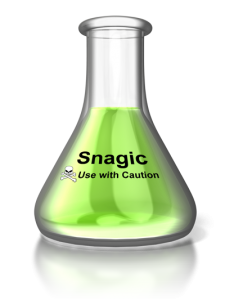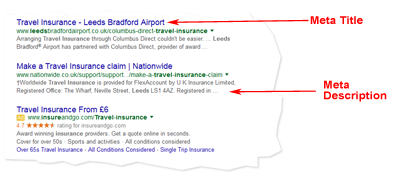

Posted: 2016-04-26 15:53:13

It is a fair bet that most people reading this will have been pestered with spam emails, or website 'enquiries' offering website reviews, search optimisation, zillions of Twitter posts, Facebook posts and more.
The object being to get traffic to the website and get it on the first page of Google. It often sounds like (and often is) a combination of snake oil and black magic - 'snagic'?
For those people without the detailed technical knowledge to make a judgement on the claims made on these emails this stuff is at best noise and at worst an expensive scam.
The following 5 basic SEO tips are intended to go some way to provide information to help you make a rational judgement, but more importantly also provide information to take this stuff on yourself - for free.
There are some basic rules to follow and here are 5 to get you started.
If you are trying to get on the first page of Google, it might be worth considering what for.
If it is for the company name, that is not such a hard task as the company name is usually unique. And anyway, if the searcher knows the company name already, the chances are they also know the website address.
If you are going to be on the first page of Google it needs to be for a search term that someone will use - who does not know your company exists. You need to have a clear vision of what those search terms are, because there should be more than one.
If you have never done this before, write down 10 search terms you would ideally like to be found on - everything else will stem from this.
As a rule of thumb, you should calculate on creating a dedicated web page for each of the important search terms - this is a good basic starting point.
It is as true on the street as it is on the battle field as it is in business. There is is no point fighting a battle unless you believe you have a realistic chance of winning.
If, when you have selected your top 10 search terms you find that some are highly competed on, you might just have to think again.
For example, if you are selling 'insurance', you will have some difficulty if you are expecting to get a good search position with the term 'insurance' which is of course dominated by some very large businesses.
It is much better to be more specific to either a specialism, a locality, or both. If you are based in Leeds, selling travel insurance then the best term might be 'travel insurance leeds'.
As a general rule, the more niche your product, or service, the easier it will be - especially if you add in the locality dimension.
Also, searchers who put in very specific terms are much more likely to be buyers as they are telling the search engine exactly what they want.
Once you know the 'refined' search terms you want to be found on, you can then focus on content. It is often the case that the above search term exercise is undertaken after the website has been built and content added.
This is because websites are often built and populated with the business's products and services in mind first and how they appear on the search engines second.
So, the chances are you are considering existing content rather than new. There is hope though - stick with it and read on.
Google in particular has spent a great deal of time and money since the late 1990s making sure that content delivered in their search results is as tightly focussed on the search term as possible.
This is not just in terms of the words matching up, but in the quality and appropriateness of the content. So a web page stuffed over and over again with the search term you want to be found on will just not work.
Not only that, the page will be penalised for the future so that even if you get it right, it will not work for you.

So what is 'quality content' in an internet world awash with content? Well it is stuff that has some value.
I would like to think this blog post is 'quality' in that it delivers both useful information and advice.
You can act on this advice and it will add value to how you present your products and services on the web. Yes, you are giving stuff away (information), but in so doing you are also demonstrating knowledge and giving some indication of the quality of other services you may offer on a paid for basis.
A quality business offering travel insurance might provide advice on all of the pitfalls of travel insurance and how best to select a travel insurance broker, or provider.
You also need sufficient content. A minimum of 500 words per page is recommended and you might consider going further than that.
That does not mean 500 words of waffle though - keep it quality. Remember Content is King, but Quality is Queen.
The advice to add a lot of content to a page usually brings the response that people hate loads of content and no longer have the will, or the time to read long pages of guff.
I agree. There is always a tension between creating a page that is search engine friendly and user friendly at the same time. A balance needs to be found between the two.
Fortunately there is a simple answer to this problem. You should organise the content so that you get a summary at the top of the page, with detail further down the page.
This way the reader can decide if the content is for them quickly. Detail can then be easily found further down the page for those that want it.
You can place a 'call to action' between the two, encouraging a contact of some kind so that those that make a quick decision on summary information can quickly get to a result they are after. Hopefully this is a sale for you.
The search engine will read it all, no matter how the content is arranged on the page.
Each web page contains broadly the same structure no matter how it appears visually.
Each component in the structure is like a tick box that the search engine will work through to make a decision on how and where to index the page.
Not all of this stuff is visible, some of it only appears on the search results and cannot be seen on the actual web page.
This invisible content is called meta data which really means it is descriptive information about the page content rather than content in its own right.
Your content should ideally contain the key term the page is designed for in the following locations on the page:
 The Meta Title - This title appears in the tab the web page is displayed on and as the title on the search results
The Meta Title - This title appears in the tab the web page is displayed on and as the title on the search resultsHow successful the page will be will depend upon many other things, but everything else is built on this basic framework.
For existing pages, do not despair as content can be restructured to accommodate the above and old pages redirected to the new so that existing search engine positioning is not lost.
For those businesses that do not obtain business from their web presence and therefore make no effort to get business from the web, it may well be worth considering whether this is a self fulfilling prophecy.
It is also worth considering how many opportunities have simply passed your business by without you knowing.
For many non-ecommerce businesses, the internet is a not a prime sales and/or marketing channel - it is just one of potentially many.
However, it continues to become more powerful with the UK often leading the world in using the internet as a research and purchasing medium - even ahead of the USA in many instances.
It might have been possible to ignore this channel in the past, it will be less easy in the future. The tips above, do not cost any money at all, just a bit of time and thought.
Better still, this structured approach, combined with some analytics puts you in the driving seat of your own internet marketing channel without having to use any sort of snake oil or black magic at all.
TTMG Internet is of course happy to help, so if you need guidance, or further information - give us a call.